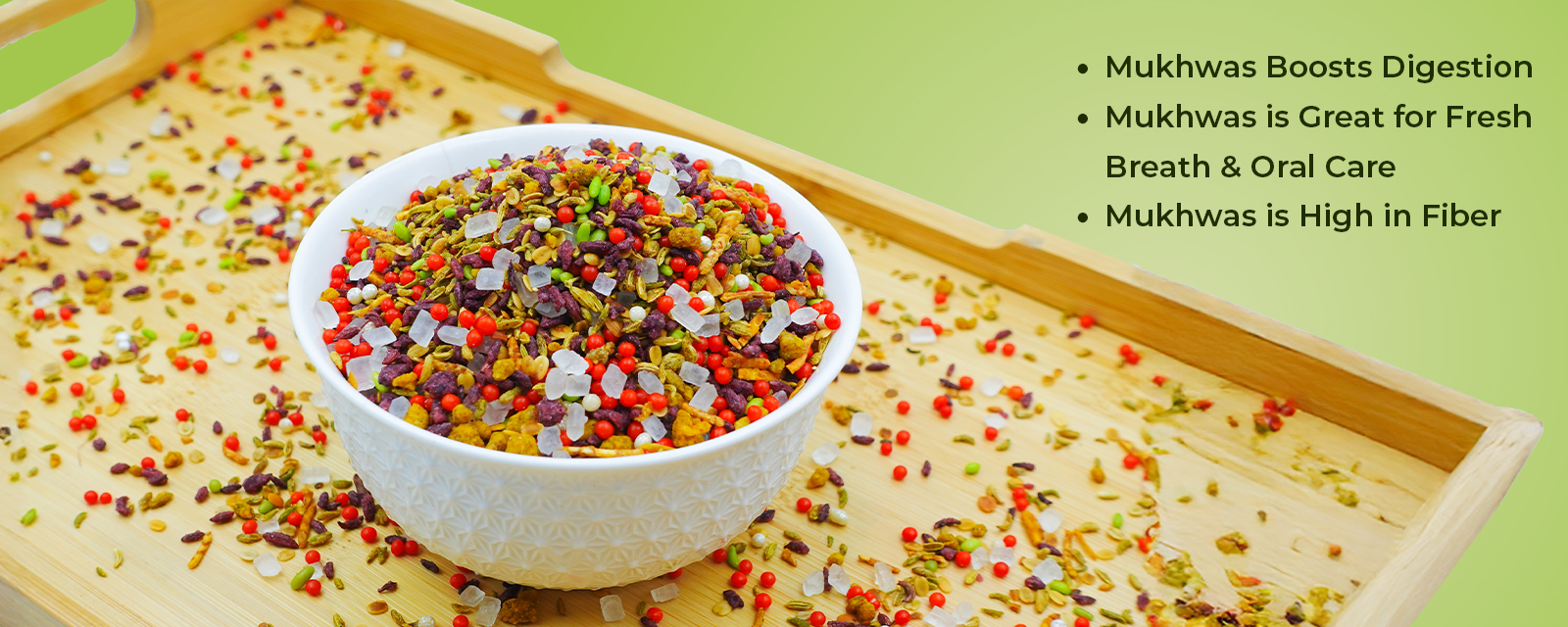Colorful, delicious, crunchy, and refreshing - Mukhwas gives a tiny burst of flavor after a hearty meal!
Mukhwas is traditionally eaten after meals, as a mouth freshener.
But beyond just being a post-dinner ritual, this mix of seeds and herbs hides a treasure chest of health benefits.
From soothing digestion to supporting oral hygiene and even helping metabolism, mukhwas is a lot more than a sweet endnote - it’s a centuries-old wellness practice, now backed by science.
In this, we tell you everything about mukhwas, its incredible ingredients, and the health benefits of mukhwas every day.
What is Mukhwas?
Mukhwas comes from a Sanskrit word, मुखवास, meaning “mouth smell,” referring to its refreshing aftertaste.
Traditionally served in Indian households and restaurants, mukhwas doesn’t refer to just one recipe but rather a category that varies regionally in flavour and style.
Some mukhwas blends are sweeter with sugar-coated fennel, while others are spiced and aromatic with ajwain or sesame.
The Power-Packed Ingredients of Mukhwas
Each handful of mukhwas has the power of healthy ingredients, a little pharmacy of nature.
Common ingredients of Mukhwas include:
- Fennel seeds (saunf) - Known for their sweet aroma and digestive benefits.
- Ajwain seeds (carom) - Rich in thymol, which helps stimulate digestive enzymes.
- Sesame seeds (til) - A source of calcium, magnesium, and healthy fats.
- Flax seeds - Packed with fiber and omega-3s, supporting gut health.
- Coriander seeds - Cooling and known to aid metabolism.
- Cardamom & Cloves - Add freshness while offering antimicrobial effects.
- Rose petals or coconut flakes - For fragrance and a touch of natural sweetness.
The flavour and ingredients of mukhwas change across regions:
In Gujarat, flaxseed and sesame-based blends are often roasted and lightly sweetened. In Maharashtra, coconut flakes and fennel are added for a topical touch.
In Rajasthan, fragrant rose petals with anise seeds are used for a cooling effect. In Bengal, pan-inspired mukhwas were made with betel leaves and areca nut.
Each version not only satisfies the palate but also ties into local health practices and climates.
These diverse ingredients make mukhwas both a flavor enhancer and a nutrient-rich snack.

Health Benefits of Mukhwas
Here are the top health benefits of Mukhwas:
Mukhwas Boosts Digestion:
One of the main reasons mukhwas exists is to promote digestion after hearty meals.
Seeds like fennel and ajwain are considered carminatives; they reduce gas, bloating, and stomach discomfort.
A 2023 study found that ajwain, when combined with celery, significantly reduced symptoms of indigestion and improved quality of life in patients with functional dyspepsia - proving what Indian wisdom is right.
Chewing mukhwas also stimulates the production of saliva, which is an important first step in digestion as it helps break down food and regulate acidity in the mouth.
Mukhwas is Great for Fresh Breath & Oral Care:
Mukhwas is beloved for its ability to freshen breath, thanks to its aromatic oils in fennel, cardamom, and coriander.
But there’s more, ajwain seeds have strong antibacterial properties, helping reduce harmful bacteria in both the mouth and digestive tract.
When you chew mukhwas, you’re not just masking bad breath - you’re actively creating a cleaner, healthier oral environment.
Mukhwas is High in Fiber:
Beyond the taste and freshness in the mouth, mukhwas carries a surprising nutritional edge.
Flax and fennel seeds are naturally high in soluble fiber, helping regulate bowel movements and helping you feel full for longer.
An analysis published in the Journal of Food Science reported that fennel seeds contain nearly 19g of fiber per 100g, along with essential minerals like potassium and magnesium - making them beneficial for digestion and heart health.
Some mukhwas also contain sesame seeds, which are rich in calcium and zinc and are excellent for bone health.
The Bottom Line:
Mukhwas is more than just a mouth freshener; it’s a blend of seeds & herbs that have digestive, oral, and nutritional benefits.
So the next time you reach for a spoonful of mukhwas, know that you’re not just enjoying a tasty ritual - you’re nurturing your health in more ways than one.
It’s nature’s way of reminding us that wellness doesn’t always come in the form of pills - sometimes it’s in the little bowl passed around after dinner.







